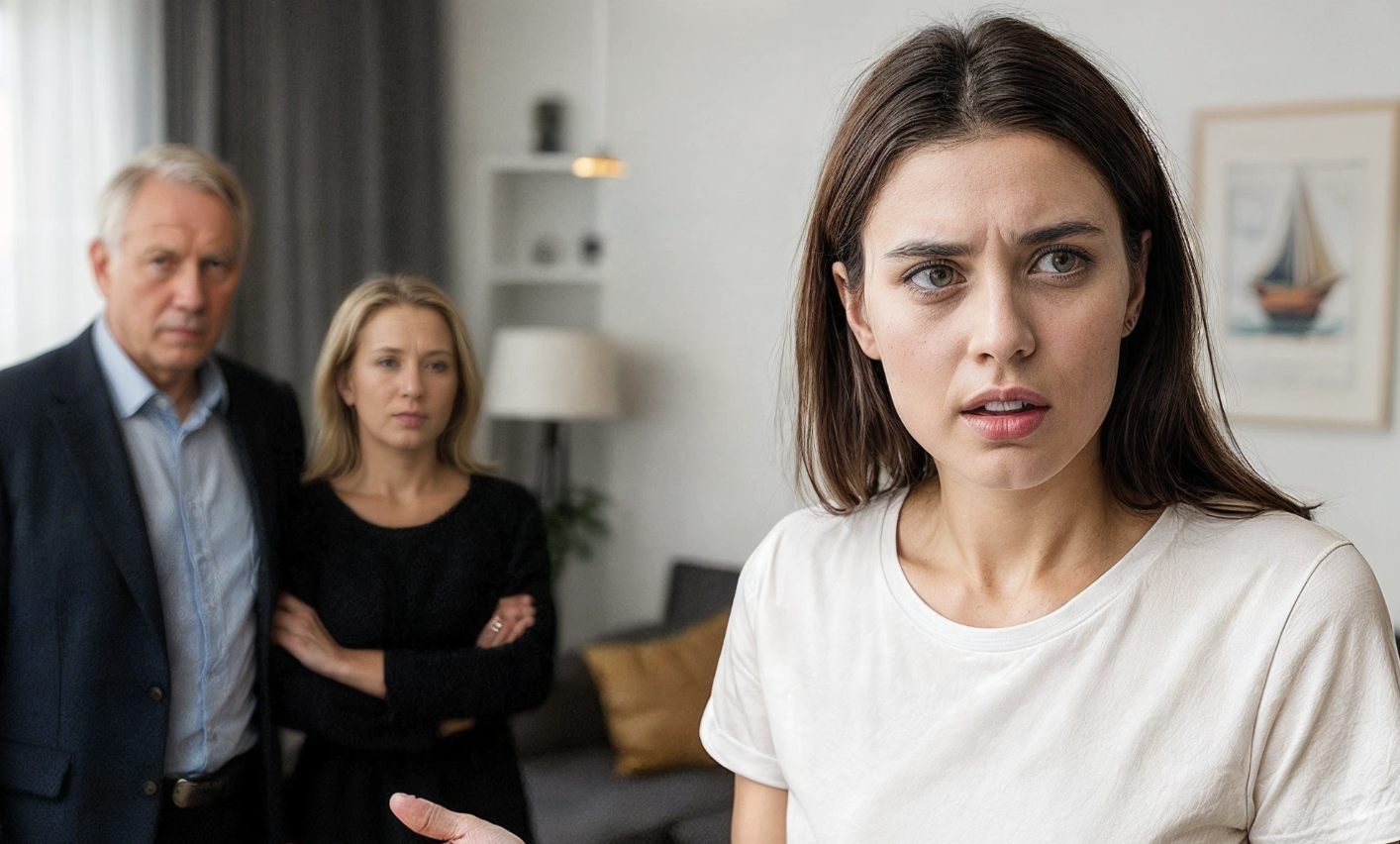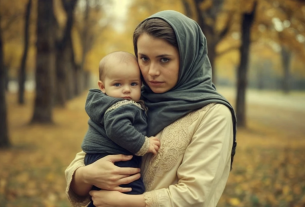The doorbell rang so unexpectedly that Anna flinched and almost dropped her cup of coffee. Sunday morning promised to be lazy and quiet—they and Maksim had planned to spend it at home with books and TV shows. No guests, no fuss.
“Who could that be?” Max looked up from his laptop, frowning in surprise.
“No idea. Maybe the neighbor asking for salt?”
Anna opened the door—and froze. On the threshold stood a man and a woman of about fifty-five, elegantly dressed, their faces tense. The woman gave her a measuring look from head to toe, lingering on the lounge pants and old T-shirt.
“Hello,” Anna managed, instantly realizing who they were. She’d seen photographs of Maksim. “You… Max’s parents?”
“Yes,” the woman answered curtly and stepped into the hallway without waiting to be invited. “Is Maksim home?”
“Mom? Dad?” Max appeared in the corridor, and Anna saw the color drain from his face. “What are you… I didn’t know you were coming…”
“We were nearby,” his father took off his coat and hung it on a hook. “We decided it was time to meet your… fiancée. Since you’re determined to marry, despite everything.”
The tone with which he said “fiancée” made Anna clench her fists. Max had said his parents had not been enthusiastic about the wedding news, but she hadn’t expected such open disdain.
“Come in,” Anna pulled herself together and squared her shoulders. “Sorry we didn’t prepare for company—we didn’t know…”
“That’s obvious,” Max’s mother looked around the living room with poorly concealed disappointment. Two half-finished cups sat on the coffee table among scattered magazines; a crumpled pillow lay on the sofa. Ordinary everyday mess that suddenly seemed shameful to Anna.
A heavy silence settled. Max stood between his parents and Anna, clearly at a loss for words. Anna saw the tension in his shoulders, the clenched jaw. He looked cornered, miserable—and that hurt her most of all. She didn’t want to be the cause of a rift between him and his parents.
“Please sit down,” Anna gestured to the sofa. “I’ll just tidy up a bit…”
“No need to fuss,” Max’s mother sat, placing her purse on her lap. “We won’t be long. We just wanted to see what kind of conditions our son is living in.”
“Conditions”—again that tone, full of veiled condemnation. Anna felt a wave of irritation rise inside. She had bought this apartment herself, with money earned over five years of hard work at a large international company. A one-bedroom, yes, but in a good neighborhood with quality renovations. She was proud of the apartment, and no one had the right to look down on it.
“The conditions are perfectly fine,” Max finally found his voice. “Mom, Dad, this is Anya’s apartment. She bought it herself, before we met.”
“Yes, yes, Maksim told us that you… work,” Max’s father said it as if it were something unusual and slightly suspect. “At some foreign company?”
“At a German logistics corporation,” Anna perched on the edge of an armchair. “I’m a regional business development manager for Eastern Europe.”
“Oh, I see,” his mother nodded, but not a hint of respect or interest appeared in her eyes. “Maksim, perhaps offer tea or coffee? We’ve been on the road since morning; it would be nice to have something to drink.”
Max rushed to the kitchen. Anna stood to follow.
“I’ll help…”
“Sit, sit,” his mother waved a hand. “Maksim can handle it himself. He’s independent—always has been since childhood. Though he hasn’t always made the best choices.”
The last remark was loud enough for Anna to hear. She bit her lip, swallowing a sharp retort. She had to stay calm, give them no pretext for a scene. For Max’s sake.
Max’s father was examining the bookshelf, occasionally casting appraising glances at Anna.
“Maksim said you’re not from Moscow,” he finally said. “How long have you been here?”
“Eight years. I came to enter university and stayed after graduating.”
“Moscow State?” There was a note of hope in his voice.
“Financial University, International Economic Relations.”
“Ah,” the father lost interest and turned back to the shelves.
A stab of hurt pricked Anna. She had graduated with honors, won a scholarship for an internship in Germany, returned with excellent recommendations, and moved quickly up the career ladder. She spoke three languages, managed projects with multimillion-dollar budgets, and at twenty-nine had her own apartment in Moscow and a stable high income. But to these people none of it mattered. She was a “girl from the provinces,” and that was enough for a verdict.
Max returned with a tray, the cups rattling. His hands were slightly shaking.
“Here, I made some tea… We have cookies somewhere…”
“No need for cookies,” his mother took a cup, sipped, and grimaced. “It’s boiling! Maksim, you know I don’t drink hot tea.”
“Sorry, Mom, I forgot…”
Anna watched him—a grown, successful thirty-year-old man—suddenly turn into a guilty little boy eager to please strict parents. It was painful to see.
“Maksim told me you wanted him to marry Veronika,” Anna decided to go on the offensive. Better to discuss things openly than endure these barbed jabs. “Your friends’ daughter.”
Silence fell. Max’s mother slowly set her cup on the table; his father froze, staring out the window.
“Veronika is a wonderful girl,” his mother said at last. “From a good family. We’ve known her since childhood. She and Maksim have a lot in common—they grew up in the same circle, they understand each other…”
“Mom, enough,” Max sank onto the sofa beside Anya and took her hand. “I don’t love Veronika. I never did. We were just childhood friends, that’s all. And Anya—she’s my love. We’ve been together for three years, and I want her to be my wife.”
“Three years, and we’re only hearing about this now,” his father turned to them, his voice wounded. “You kept her from us.”
“I didn’t keep anything,” Max rubbed his face wearily. “I just didn’t rush to introduce you. I knew you’d be against it. That you wouldn’t approve of my choice.”
“And you were right,” his mother straightened, folding her hands on her knees. “Maksim, you understand we want what’s best for you? We’ve walked this path ourselves; we know how hard it is for people to make it in Moscow without connections, without support. Your father worked sixteen hours a day so we could gain a foothold here, so you could have what we didn’t. And now you want to tie your life to a girl who has nothing…”
“I have an apartment, a job, an education,” Anna couldn’t hold back. “What exactly is it that I don’t have?”
“Roots,” his mother looked at her coolly. “Connections. Standing in society. You’re nobody here. A girl from the provinces like thousands in Moscow. Today you have a job, tomorrow you don’t. Today you have an apartment, tomorrow a mortgage you can’t pay. And through your fault Maksim will lose everything we built for him.”
“Mom, stop!” Max jumped up. “What right do you have to talk like that?!”
“I have the right to care about my son!” his mother rose too. “You think I don’t see what’s going on? You live in her apartment, on her territory. You depend on her. That’s not right, it’s not manly!”
“I pay half the bills,” Max went pale. “I’m not living at her expense.”
“But the apartment is hers. And you feel that every day. Maksim, you had a chance to join your father’s business, get a stake, build a career. But you chose this job at a little startup where they pay you pennies…”
“They pay me a decent salary, and I do what I enjoy!”
“You’re thirty—it’s time to think about the future, not about what you enjoy!”
Anna sat with her fists clenched, listening as the conflict unfolded. She realized she was the cause of it, that without her Max’s relationship with his parents would be simpler, calmer. And that realization made her feel sick.
Max’s mother paced the room, stopped at the window, then turned sharply:
“All right. Since we’re here, let’s at least talk properly. No point standing around like at a funeral.” She looked at Anna. “Why are you standing there like a statue? Go set the table! Or didn’t they teach you in your village how guests are to be received!”
The silence after those words was deafening. Anna rose slowly from the armchair. Inside everything boiled—hurt, anger, the urge to scream and throw these people out of her home. But she kept control; she was used to mastering her emotions. In negotiations with serious partners, emotions were a luxury one couldn’t afford.
“You know what, Marina Lvovna,” Anna said calmly, looking the woman straight in the eye. “Let me explain something. In my village, as you put it, they really did teach me how to receive guests. They taught that a visit should be announced in advance. You call, ask if it’s convenient for the hosts, agree on a time. They taught us not to come empty-handed—bring flowers, a treat, a gift. They taught us to enter someone else’s home with respect, not with a critical eye and snide remarks.”
Max’s mother opened her mouth, but Anna didn’t let her speak:
“You showed up unannounced on a Sunday morning when Maksim and I planned to spend time at home, quietly. You walked into my apartment—yes, mine, I bought it with my own money—and immediately started making comments. You look at me like a maid who’s supposed to wait on you. I’m sorry, but I don’t owe anyone anything. Least of all people who come into my home without an invitation and behave rudely.”
“How dare you…” Max’s mother began, but Anna cut her off:
“I dare because this is my home. And I won’t let anyone speak to me with contempt under my own roof. You want to know who I am? Fine. I grew up in a small town, the daughter of a teacher and an engineer. My parents weren’t wealthy, but they gave me a good upbringing and a love of learning. I came to Moscow at eighteen and got into university on a state scholarship because I scored high on the exams. I studied and worked at the same time to afford a room in a dorm and food. I didn’t ask my parents for help because I knew it was hard for them. I won a competition for an internship in Germany, spent six months there, learned the language, got references. I came back and got a job at an international company.”
Anna’s voice was even, but every word carried weight:
“In five years I went from assistant to regional manager. I lead a team of fifteen people. I negotiate with top managers of major European and Russian companies. I earn more than most of my classmates, including many who studied at Moscow State. I bought this apartment at twenty-seven and paid off the mortgage in two years. I don’t have rich parents, connections, or ‘standing in society,’ as you put it. I have only my mind, my skills, and my willingness to work harder and better than others. And that turned out to be enough to build a life I’m proud of.”
Max’s father was looking at her with undisguised surprise. His mother stood pale, lips pressed tight.
“As for your son,” Anna softened her tone a little, “I love him. Not for money, not for prospects, not for connections. I fell in love with his mind, his kindness, his sense of humor, and his ability to see the good in people. I didn’t force a relationship on him, didn’t insist he move in with me. He made that decision himself because we wanted to be together. Yes, he lives in my apartment. But that’s temporary. We plan to save and buy a larger place together, in both our names. Equal shares. Because we’re partners. Equal partners.”
Max looked at her with admiration and gratitude. Anna walked over and took his hand.
“I’m not going to compete with Veronika or anyone else for the right to be with your son. I’m not going to prove to you that I deserve him. Max decides for himself who he wants to be with. And if you truly love him and want him to be happy, you will accept his choice. If not—that’s your right. But then don’t be surprised if he sees you less and less.”
Max’s mother sank onto the sofa. For the first time during the visit she looked bewildered, even a little frightened.
“I… I didn’t mean to offend you,” she said at last. “It’s just… we really do worry about Maksim. We went through a lot ourselves when we moved to Moscow. I remember how hard it was, how we were received here, how people looked down on us. I thought I was protecting my son from that.”
“By protecting him from me, you’re hurting him,” Anna sat beside her. “Look at him. He’s torn between us. Is that fair to him?”
Max’s father cleared his throat and stepped closer:
“Anya… may I call you Anya?” He looked embarrassed. “Perhaps we really did jump to conclusions. We judged you without knowing you. That was wrong.”
“We were just afraid,” his mother admitted. “Afraid you would use Maksim. That you saw only profit, connections, money in him.”
“I have my own money,” Anna smiled tiredly. “And if I needed connections, I would find a way to get them. Believe me, in the corporate world I’ve learned how to build the relationships I need. I need Maksim for reasons entirely different.”
Max put his arm around her shoulders.
“Anya is the strongest person I know. She’s walked a path not everyone could. And she’s never asked me for help, even when things were hard. You know, when we met, I immediately realized she was special. She wasn’t playing games, not flirting, not pretending to be someone else. She was herself—smart, determined, self-sufficient. And that’s exactly what I fell in love with.”
“And I fell in love with him because he’s not like the careerists I have to deal with at work,” Anna looked at Max with tenderness. “He’s kind, honest, and has dreams that aren’t about money and status. He wants to create useful technologies, to make the world better. And he doesn’t care that it doesn’t bring millions. That’s worth a lot.”
Silence fell again, but now it was thoughtful, not tense.
“Maybe we should start over?” Max’s father suggested. “Make a proper acquaintance, get to know each other better. We really didn’t behave well. We came without warning and started with complaints…”
“Vladimir Sergeevich is right,” his mother wiped away sudden tears. “Anya, please forgive us. We were… biased. We judged you by stereotypes and didn’t give you a chance. That was foolish and unfair.”
Anna nodded.
“I understand that you worry about your son. All parents do. But believe me, I won’t hurt him. I want to build a happy family with him, based on mutual respect and support. The kind my parents had. They weren’t rich, but they were happy. And they taught me that happiness isn’t in money or connections—it’s in who stands beside you.”
“Do your parents… know about the wedding?” Max’s mother asked.
“Yes. They’re very happy. My mom is already planning what to wear, and my dad jokes that he’ll finally marry me off and can retire in peace.” Anna smiled. “They’re simple people, but very warm and hospitable. I think you’ll get along.”
“I’m sure we will,” Max’s father held out his hand. “Let’s start over. My name is Vladimir Sergeevich, very nice to meet you.”
Anna shook his hand, feeling the tension ebb.
“Anya. Nice to meet you, too.”
“And I’m Marina Lvovna,” Max’s mother also stood and came closer. She hesitated a second and then unexpectedly hugged Anna. “Forgive me for what I said. I truly didn’t mean to offend you. I was just… very afraid that Maksim was making a mistake.”
“Anya isn’t a mistake, Mom,” Max hugged them both. “Anya is the best thing that’s ever happened to me.”
The next few hours passed in conversation—genuine, open, without mutual reproaches. Max’s parents talked about their youth, about coming to Moscow with almost no money, how they struggled, studied, and built a business. Anna listened attentively and with understanding—their stories in many ways mirrored her own: the same hardships, the same fears, the same determination to succeed.
Marina Lvovna told how she worked as a secretary while studying evenings, how she scrimped on everything to rent a tiny room in a communal apartment. Vladimir Sergeevich recalled starting as a loader in a warehouse, gradually rising to manager and then opening his own business.
“We’ve been through a lot,” Marina Lvovna took Anna’s hand. “And that’s probably why we were so afraid for Maksim. We didn’t want him to face the same hardships. We thought if he married Veronika it would be easier… but I see now I was wrong. You’re a strong girl, Anya. And you and Maksim make a good couple. An equal couple.”
“Thank you,” Anna felt tears well. “That means a lot to me.”
“And what about the wedding?” asked Vladimir Sergeevich. “When are you planning it?”
“We were thinking late summer,” Max looked at Anya. “A small ceremony, just close family. We don’t want a lavish celebration.”
“If you’d like, I can help with the arrangements,” offered Marina Lvovna. “I have experience, contacts… though,” she stopped herself, “only if you don’t mind. I don’t want to impose.”
“We’d be happy for your help,” Anna smiled. “Honestly, I have no idea how to plan a wedding. Work takes all my time.”
“Then it’s settled. And… Anya, would you come visit us sometime? I’d like to show you our home, photos of Maksim as a child…” Marina Lvovna smiled shyly. “If you don’t mind, of course.”
“I’d love to,” Anna nodded. “And please come to us as well. Just next time, let us know in advance so I can prepare and host you properly.”
When Max’s parents were getting ready to leave, Vladimir Sergeevich hugged his son.
“You’ve chosen a good girl, son. Strong, smart, worthy. We give our blessing to your marriage. And… forgive us for not understanding at first.”
“It’s okay, Dad,” Max hugged him tightly. “What matters is that now you know Anya—the real Anya, not the image you imagined.”
At the door, Marina Lvovna hugged Anna again.
“Thank you for not throwing us out. After the way I behaved… you had every right to slam the door in our faces.”
“I couldn’t do that,” Anna smiled gently. “You’re Max’s parents. I want us to have a good relationship. For his sake. For our future family.”
When the door closed behind their guests, Max leaned back against it and shut his eyes.
“God, what a nightmare it was at first… Anya, you were amazing. I’ve never seen anyone put my mother in her place so calmly and with such dignity.



